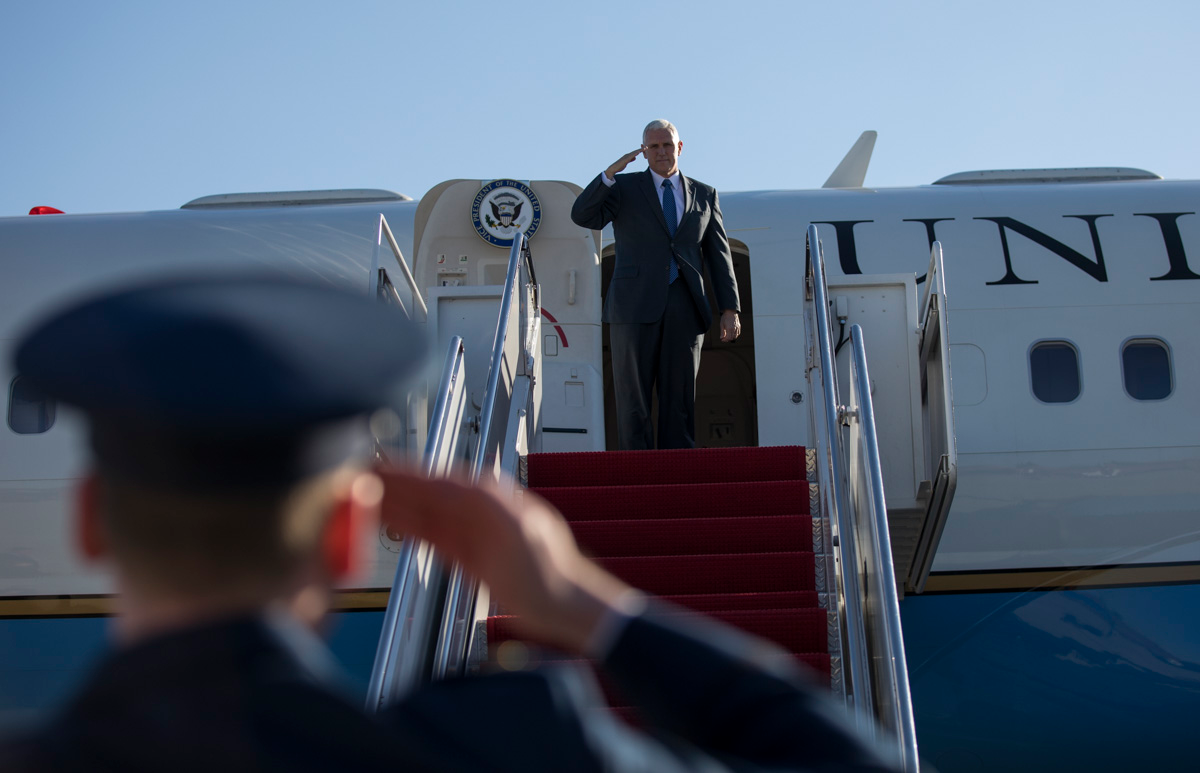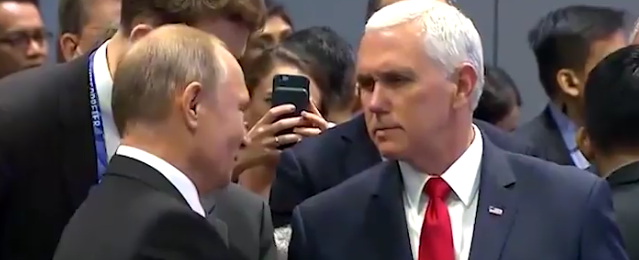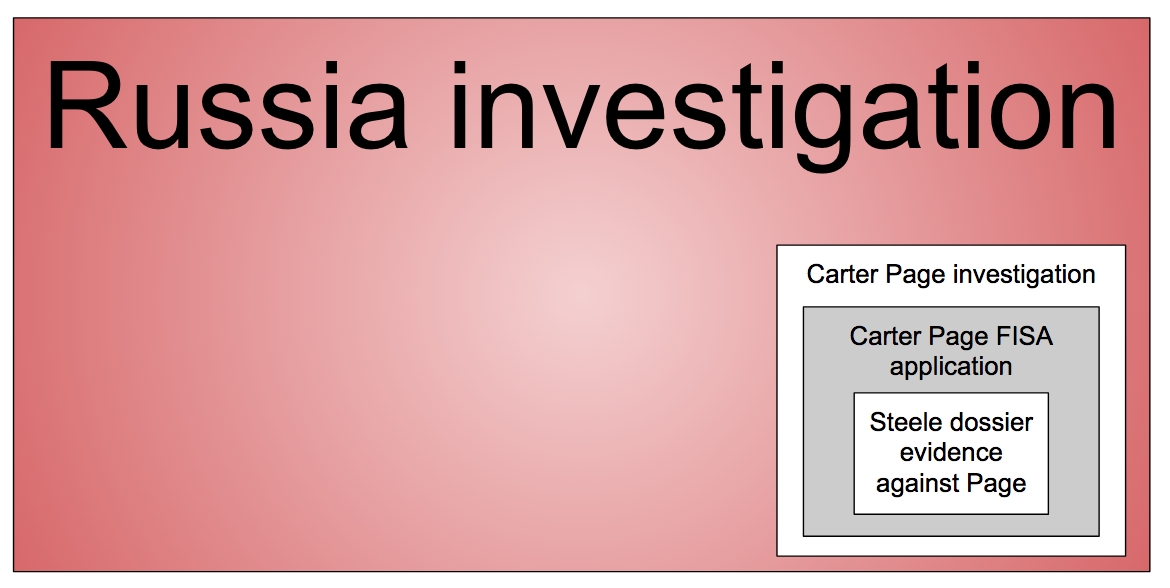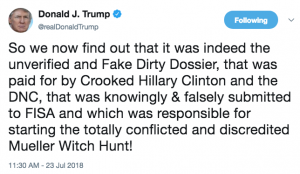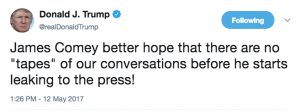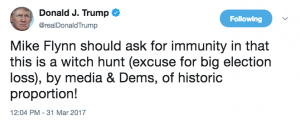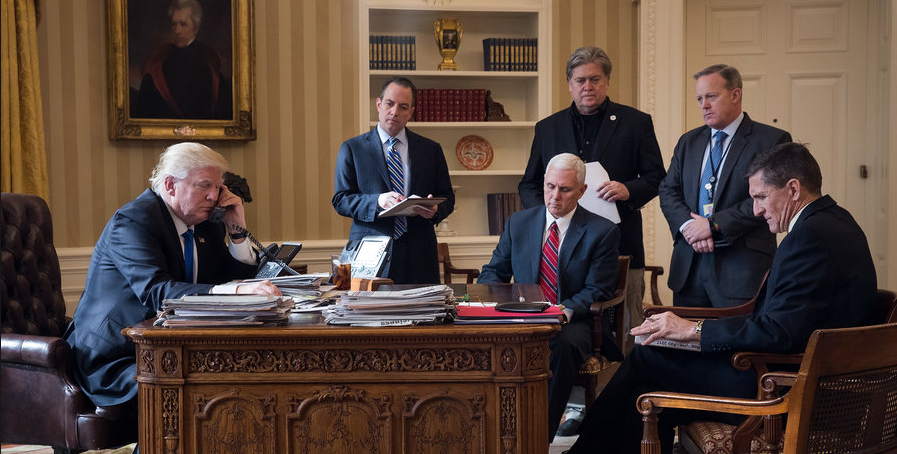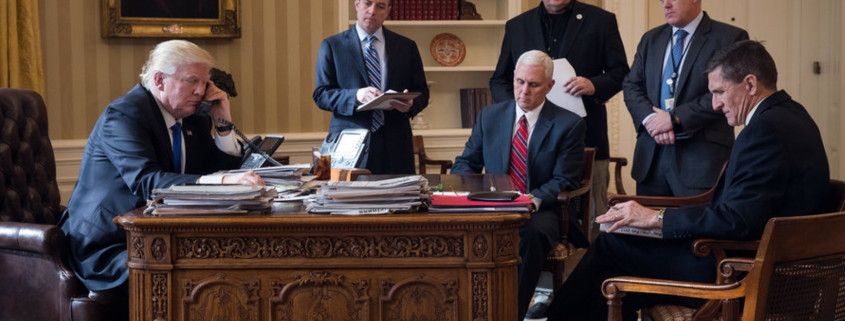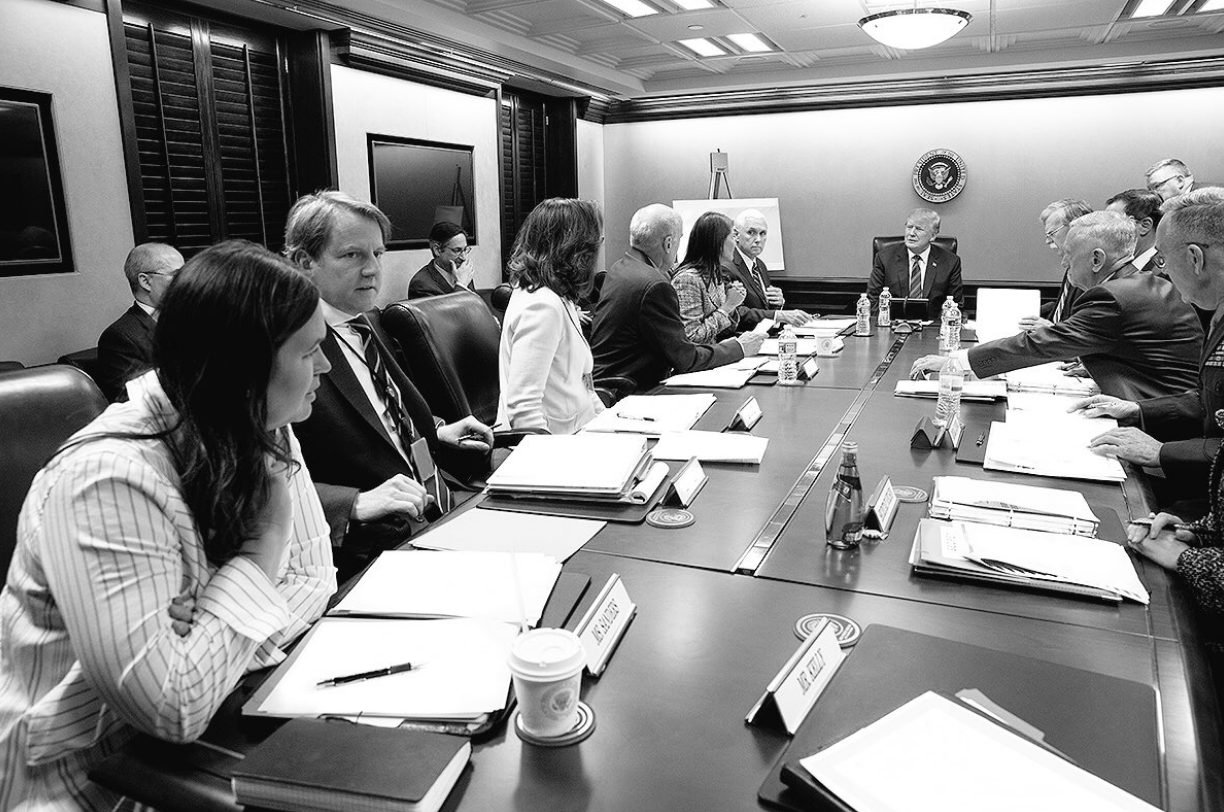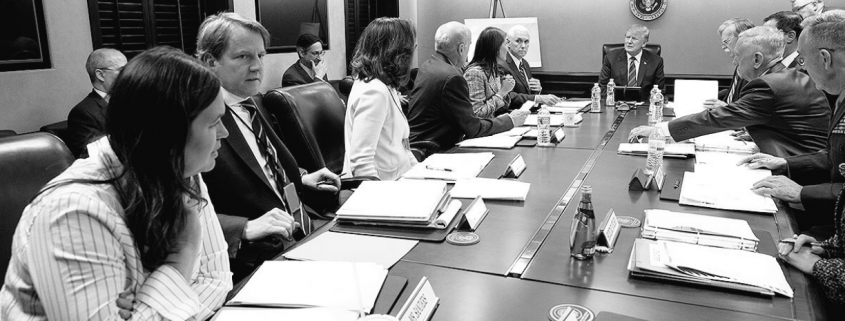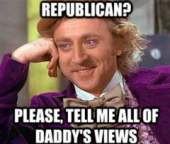In this series, I’m analyzing the Mueller questions as understood by Jay Sekulow and leaked to the NYT to show how they set up a more damning investigative framework than commentary has reflected.
This post laid out how the Agalarovs had been cultivating Trump for years, in part by dangling real estate deals and close ties with Vladimir Putin. This post shows how during the election, the Russians and Trump danced towards a quid pro quo agreement, with the Russians offering dirt on Hillary Clinton in exchange for a commitment to sanctions relief, with some policy considerations thrown in. This post laid out how, during the transition period, Trump’s team took a series of actions they attempted to keep secret that moved towards consummating the deal they had made with Russia, both in terms of policy concessions, particularly sanctions relief, and funding from Russian sources that could only be tapped if sanctions were lifted.
This post will look at Mueller’s reported investigative interest in Trump’s reaction to discovering the “Deep State” was investigating the election year operation, including the actions his team had tried to keep secret. Note, I have put all of the events leading up to Flynn’s firing here (not least because I think the firing itself often gets treated improperly as obstruction), though just some of the Jim Comey events. I will repeat the timeline of events in the next post, which overlaps temporally, for clarity.
January 6, 2017: What was your opinion of Mr. Comey during the transition?
This is a baseline question for Trump’s firing of Jim Comey. At a minimum, Trump would need to explain his decision to keep Comey. It also provides Trump an opportunity to rebut Comey’s claim that, in the January 6 meeting, Trump told Comey he:
had conducted myself honorably and had a great reputation. He said I was repeatedly put in impossible positions. He said you saved her and then they hated you for what you did later, but what coice did you have? He said he thought very highly of me and looked forward to working with me, saying he hoped I planned to stay on. I assured him I intended to stay. He said good.
January 6, 2017: What did you think about Mr. Comey’s intelligence briefing on Jan. 6, 2017, about Russian election interference?
One key detail Comey (and the other representatives of the intelligence community) would have detailed for Trump that day is not just that Russia interfered in the election, but their basis for concluding that “We also assess Putin and the Russian Government aspired to help President-elect Trump’s election chances,” a conclusion Republicans have objected to repeatedly.
In his book, but not his memos, Comey describes that immediately after the briefing, Trump first asked for assurances Russian interference hadn’t affected the outcome and then, with his team, started strategizing how to spin the conclusions so as to dismiss any outcome on the election.
‘I recall Trump listening without interrupting, and asking only one question, which was really more of a statement: “But you found there was no impact on the result, right?” The intelligence team said they had done no such analysis.
‘What I found telling was what Trump and his team didn’t ask. They were about to lead a country that had been attacked by a foreign adversary, yet they had no questions about what the future Russian threat might be.’
Instead, Trump and his team immediately started discussing how they would “spin” the information on Russia as if the intelligence officers were not in the room. ‘They were keen to emphasize that there was no impact on the vote, meaning that the Russians hadn’t elected Trump.’
This reflects the same concern expressed in the KT McFarland email from just days earlier (which probably reflected detailed Trump involvement) that acknowledging Russian involvement would “discredit[] Trump’s victory by saying it was due to Russian interference.”
January 6, 2017: What was your reaction to Mr. Comey’s briefing that day about other intelligence matters?
In its analysis of the questions, NYT takes this question to be exclusively about Comey’s briefing on the Steele dossier, and it may be. But in Obama’s January 5 briefing covering the same issues, according to Susan Rice, Comey and others discussed concerns about sharing classified information with the Trump team, especially Mike Flynn.
The memorandum to file drafted by Ambassador Rice memorialized an important national security discussion between President Obama and the FBI Director and the Deputy Attorney General. President Obama and his national security team were justifiably concerned about potential risks to the Nation’s security from sharing highly classified information about Russia with certain members of the Trump transition team, particularly Lt. Gen. Michael Flynn.
Even though concerns about Flynn came up in that Obama briefing, the FBI counterintelligence investigation did not. It’s possible that this passage from Comey’s memo, which describes the main part of the briefing and not that part dedicated to the Steele dossier, pertained to the counterintelligence concerns about Flynn,which Obama had already shared with Trump the previous fall; such a warning may or may not have included Flynn’s conversations with Sergey Kislyak.

If Comey briefed anything to do with Flynn, it would significantly change the importance of subsequent events.
As for the Steele dossier conversation, which surely is included with this question, Comey has claimed that Trump first tried to convince Comey is wasn’t true that he would need to “go there” to sleeping with prostitutes, “there were never prostitutes,” even though Trump’s reference to “the women who had falsely accused him of grabbing or touching them” actually undermined his defense.
Comey has also claimed that Trump seemed relieved when he said (in the context of the Steele briefing), that the FBI was not investigating him. Importantly, this took place after Comey had said he didn’t want people to claim the information came from the FBI.
I said media like CNN had them and were looking for a news hook. I said it was important that we not give them an excuse to write that the FBI has the material or [redacted] and that we were keeping it very close-hold.
[snip]
I responded that we were not investigating him and the stuff might be totally made up but that it was being said out of Russia and our job was to protect the President from efforts to coerce him. I said we try to understand what the Russians are doing and what they might do. I added that I also wanted him to know this in case it came out in the media.
He said he was grateful for the conversation, said more nice things about me and how he looks forward to working with me and we departed the room.
January 12, 2017: What was your reaction to news reports on Jan. 12, 2017?
On January 12, in the context of a discussion of Trump aiming for better relationships with Putin, David Ignatius reported revealed that Flynn had called Sergey Kislyak “several times,” asking whether but not asserting that it might be an attempt to undercut sanctions.
Trump said Wednesday that his relationship with President Vladimir Putin is “an asset, not a liability.” Fair enough, but until he’s president, Trump needs to let Obama manage U.S.-Russia policy.
Retired Lt. Gen. Michael T. Flynn, Trump’s choice for national security adviser, cultivates close Russian contacts. He has appeared on Russia Today and received a speaking fee from the cable network, which was described in last week’s unclassified intelligence briefing on Russian hacking as “the Kremlin’s principal international propaganda outlet.”
According to a senior U.S. government official, Flynn phoned Russian Ambassador Sergey Kislyak several times on Dec. 29, the day the Obama administration announced the expulsion of 35 Russian officials as well as other measures in retaliation for the hacking. What did Flynn say, and did it undercut the U.S. sanctions? The Logan Act(though never enforced) bars U.S. citizens from correspondence intending to influence a foreign government about “disputes” with the United States. Was its spirit violated? The Trump campaign didn’t immediately respond to a request for comment.
The report neither revealed the FBI had intercepts of the conversation nor confirmed an investigation. But it may have alerted Trump that the actions he was probably a party to weeks earlier might have legal consequences.
January 24: FBI interviews Mike Flynn and he lies about talking about sanctions
January 26 and 27, 2017: What did you know about Sally Yates’s meetings about Mr. Flynn?
According to Sally Yates’ public testimony, she met with Don McGahn to discuss Mike Flynn’s interview with the FBI on January 26, 2017. She framed it by describing that DOJ knew Mike Pence’s January 15 comments about Flynn’s conversations with Kislyak were not correct.
YATES: So I told them again that there were a number of press accounts of statements that had been made by the vice president and other high-ranking White House officials about General Flynn’s conduct that we knew to be untrue. And we told them how we knew that this – how we had this information, how we had acquired it, and how we knew that it was untrue.
And we walked the White House Counsel who also had an associate there with him through General Flynn’s underlying conduct, the contents of which I obviously cannot go through with you today because it’s classified. But we took him through in a fair amount of detail of the underlying conduct, what General Flynn had done, and then we walked through the various press accounts and how it had been falsely reported.
We also told the White House Counsel that General Flynn had been interviewed by the FBI on February [sic] 24. Mr. McGahn asked me how he did and I declined to give him an answer to that. And we then walked through with Mr. McGahn essentially why we were telling them about this and the first thing we did was to explain to Mr. McGahn that the underlying conduct that General Flynn had engaged in was problematic in and of itself.
Secondly, we told him we felt like the vice president and others were entitled to know that the information that they were conveying to the American people wasn’t true. And we wanted to make it really clear right out of the gate that we were not accusing Vice President Pence of knowingly providing false information to the American people.
And, in fact, Mr. McGahn responded back to me to let me know that anything that General Flynn would’ve said would have been based — excuse me — anything that Vice President Pence would have said would have been based on what General Flynn had told him.
We told him the third reason was — is because we were concerned that the American people had been misled about the underlying conduct and what General Flynn had done, and additionally, that we weren’t the only ones that knew all of this, that the Russians also knew about what General Flynn had done.
And the Russians also knew that General Flynn had misled the vice president and others, because in the media accounts, it was clear from the vice president and others that they were repeating what General Flynn had told them, and that this was a problem because not only did we believe that the Russians knew this, but that they likely had proof of this information.
And that created a compromise situation, a situation where the national security adviser essentially could be blackmailed by the Russians. Finally, we told them that we were giving them all of this information so that they could take action, the action that they deemed appropriate.
I remember that Mr. McGahn asked me whether or not General Flynn should be fired, and I told him that that really wasn’t our call, that was up to them, but that we were giving them this information so that they could take action, and that was the first meeting.
Then there was a follow-up meeting on January 27. Among the five topics discussed, McGahn asked if Flynn was in legal jeopardy, and if “they” (presumably meaning he and the Associate WHCO in the meeting) could see the underlying intelligence.
WHITEHOUSE: Did you discuss criminal prosecution of Mr. Flynn — General Flynn?
YATES: My recollection is that did not really come up much in the first meeting. It did come up in the second meeting, when Mr. McGahn called me back the next morning and asked the — the morning after — this is the morning of the 27th, now — and asked me if I could come back to his office.
And so I went back with the NSD official, and there were essentially four topics that he wanted to discuss there, and one of those topics was precisely that. He asked about the applicability of certain statutes, certain criminal statutes and, more specifically,
[snip]
And there was a request made by Mr. McGahn, in the second meeting as to whether or not they would be able to look at the underlying evidence that we had that we had described for him of General Flynn’s conduct. And we told him that we were inclined to allow them to look at that underlying evidence, that we wanted to go back to DOJ and be able to make the logistical arrangements for that. This second meeting on the 27th occurred late in the afternoon, this is Friday the 27th. So we told him that we would work with the FBI over the weekend on this issue and get back with him on Monday morning. And I called him first thing Monday morning to let him know that we would allow them to come over and to review the underlying evidence.
By the time the materials for review became available on January 30, Yates had been fired, nominally because she refused to defend Trump’s Muslim ban.
The HPSCI report (particularly content newly unredacted on May 4; see PDF 63 ff) reveals there were several concerns about Flynn’s contradictory comments (which Republicans bizarrely present as conflict). First, there had been a counterintelligence investigation into Flynn still active in December 2016, though FBI may have been moving to shut it down. The interview may have been sparked by Logan Act concerns, or it may have been Flynn’s public comments to Pence (the Republican report ignores that this would pose a blackmail problem). Comey told HPSCI that the agents found Flynn — a lifetime intelligence officer — exhibited no physical signs of deceit, but made it clear the Agents did find his statements plainly conflicted with known facts.
When Mueller asks the President what he knew about the meetings, he likely wants to know (and already has answers from McGahn and likely the Associate) whether they told him about the Flynn interview, if so when, and in how much detail. If they did tell Trump, Mueller may also want to know about whether McGahn’s questions on the 27th (including whether Flynn was in legal jeopardy) reflect Trump’s own questions.
Obviously, one other subtext of this question pertains to whether Yates’ pursuit of Flynn contributed to her firing.
The other critical point about whether and what Trump knew of Yates’ meetings with McGahn: on January 27, he had his first creepy meeting with Jim Comey. Then, on January 28, he had his first phone call with Vladimir Putin, a call Flynn attended.
January 27, 2017: What was the purpose of your Jan. 27, 2017, dinner with Mr. Comey, and what was said?
At lunchtime on January 27 — so after McGahn had called Yates to set up a follow-up meeting and indicated concerns about Flynn’s legal jeopardy, but before that meeting happened — Trump called Comey and set up dinner that day. According to Comey, several minor things that would recur later came up, including questions about Andrew McCabe and Trump’s exposition of the Hillary email investigation.
In addition, five other key things happened at the meeting.
He invited the FBI to investigate “the Golden Showers” thing to prove it was a lie:
At this point, he turned to what he called “the golden showers thing”
[snip]
He said he had spoken to people who had been on the Miss Universe trip with him and they had reminded him that he didn’t stay over night in Russia for that. [this is not true]
[snip]
He said he thought maybe he should ask me to investigate the whole thing to prove it was a lie. I did not ask any questions. I replied that it was up to him, but I wouldn’t want to create a narrative that we were investigating him, because we were not and I worried such a thing would be misconstrued. Ii also said that is very difficult to disprove a lie. He said ‘maybe you’re right,’ but several times asked me to think about it and said he would also think about it.
He asked if the FBI leaks:
He asked whether the FBI leaks and I answered that of course in an organization of 36,000 we were going to have some of that, but I said I think the FBI leaks far less than people often say.
He asked if Comey wanted to keep his job, even though they had discussed it twice before:
He touched on my future at various points. The first time he asked “so what do you want to do,” explaining that lots of people wanted my job (“about 20 people”), that he thought very highly of me, but he would understand if I wanted to walk away given all I had been through, although he thought that would be bad for me personally because it would look like I had done something wrong, that he of course can make a change at FBI if he wants, but he wants to know what I think. There was no acknowledgement by him (or me) that we had already talked about this twice.
I responded by saying that he could fire me any time he wished, but that I wanted to stay and do a job I love to and think I am doing well.
He asked for loyalty:
He replied that he needed loyalty and expected loyalty.
[snip — this comes after the request for an investigation]
He then returned to loyalty, saying “I need loyalty.” I replied that he would always get honesty from me. He paused and said that’s what he wants, “honest loyalty.” I replied, “you will get that from me.”
He claimed to suspect Mike Flynn’s judgment because he had delayed in telling Trump about Putin’s congratulatory phone call:
He then went on to explain that he has serious reservations about Mike Flynn’s judgment and illustrated with a story from that day in which the President apparently discovered during his toast to Teresa May that [Vladimir Putin] had called four days ago. Apparently, as the President was toasting PM May, he was explaining that she had been the first to call him after his inauguration and Flynn interrupted to say that [Putin] had called (first, apparently). It was then that the President learned of [Putin’s] call and he confronted Flynn about it (not clear whether that was in the moment or after the lunch with PM May). Flynn said the return call was scheduled for Saturday, which prompted a heated reply from the President that six days was not an appropriate period of time to return a call from the [President] of a country like [Russia]. (“This isn’t [redacted] we are talking about.”) He said that if he called [redacted] and didn’t get a return call for six days he would be very upset. In telling the story, the President pointed his fingers at his head and said “the guy has serious judgment issues.” I did not comment at any point during this topic and there was no mention or acknowledgement of any FBI interest in or contact with General Flynn.
Trump would be hard pressed to argue the meeting was unrelated to the Yates meeting and the FBI investigation. Which would mean one thing Trump did — in a meeting where he also lied to claim he hadn’t had sex in Moscow — was to disclaim prior knowledge of the Putin meeting the next day (even while emphasizing the import of it).
Of course, the claim he thought Flynn had poor judgment didn’t lead him to keep Flynn out of the phone call with Putin the next day.
January 28: Trump, Pence, Flynn, Priebus, Bannon, and Spicer phone Vladimir Putin
February 9, 2017: What was your reaction to news reports on Feb. 8-9, 2017?
According to Jim Comey, he went for a meet and greet with Reince Priebus on February 8. While he was waiting, Mike Flynn sat down to chat with him though didn’t mention the FBI interview. Then, after clarifying that the conversation with Comey was a “private conversation,” he asked if there was a FISA order on Flynn. Comey appears to have answered in the negative. Priebus then took Comey in to meet with Trump, who defended his answer in an interview with Bill O’Reilly released on February 6) that “There are a lot of killers. You think our country’s so innocent?” After Comey criticized that part of the answer, Trump, “clearly noticed I had directly criticized him.” (h/t TC for reminding me to add this.) Since Yates had told McGahn how they knew Flynn had lied, Priebus’ question about a FISA order suggests the White House was trying to find out whether the collection was just incidental, or whether both sides of all Flynn’s conversations would have been picked up.
On February 9, the WaPo reported that Flynn had discussed sanctions, in spite of public denials from the White House that he had.
National security adviser Michael Flynn privately discussed U.S. sanctions against Russia with that country’s ambassador to the United States during the month before President Trump took office, contrary to public assertions by Trump officials, current and former U.S. officials said.
Flynn’s communications with Russian Ambassador Sergey Kislyak were interpreted by some senior U.S. officials as an inappropriate and potentially illegal signal to the Kremlin that it could expect a reprieve from sanctions that were being imposed by the Obama administration in late December to punish Russia for its alleged interference in the 2016 election.
Flynn on Wednesday [February 8] denied that he had discussed sanctions with Kislyak. Asked in an interview whether he had ever done so, he twice said, “No.”
On Thursday [February 9], Flynn, through his spokesman, backed away from the denial. The spokesman said Flynn “indicated that while he had no recollection of discussing sanctions, he couldn’t be certain that the topic never came up.”
Officials said this week that the FBI is continuing to examine Flynn’s communications with Kislyak. Several officials emphasized that while sanctions were discussed, they did not see evidence that Flynn had an intent to convey an explicit promise to take action after the inauguration.
In addition to tracking Flynn’s changing claims, it also noted that on January 15, Mike Pence had denied both any discussion of sanctions in the December call and discussions with Russia during the campaign.
On February 10, Trump was asked by reporters about Flynn’s answer. Trump played dumb: “I don’t know about that. I haven’t seen it. What report is that? I haven’t seen that. I’ll look into that.” (h/t TC)
Presumably, Mueller wants to know how surprised Trump was about this story (which actually builds on whether McGahn told him about the Yates conversation). But given Trump’s earlier question about FBI leaks, I also wonder whether Mueller knows that Trump knew this was coming. That is, some of the leaks may have come from closer to the White House, as an excuse to fire Flynn, using the same emphasis that the story (and Yates) had: the claim that Flynn had lied to Pence.
Except Mueller probably knows that the effort to soothe Russia’s concerns about sanctions made in December were a surprise to few top aides in the White House, least of all Trump.
February 13, 2017: How was the decision made to fire Mr. Flynn on Feb. 13, 2017?
We have remarkably little reporting on how and why Flynn was actually fired — mostly just the cover story that it was because Flynn lied to Pence — though after Flynn flipped last year, Trump newly claimed he had to fire Flynn because he lied to the FBI (something that, if the claims about the original 302 are correct, FBI hadn’t concluded at the time Trump fired him).
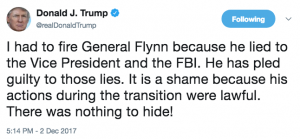
The thing is, neither story makes sense. It’s virtually certain that many people in the White House knew what Flynn had said to Sergey Kislyak back in December 2016; Tom Bossert was included in KT McFarland’s emails to Mike Flynn, and he sent it to Reince Priebus, Stephen Bannon, Sean Spicer, and at least two other people. All of those people, save Bossert, are known to have provided testimony to Mueller’s team.
But it also makes little sense to argue that Trump had to fire Flynn because he lied. If so, he would have done so either immediately, before the Putin meeting, or much later, after FBI actually came to the conclusion he had lied.
One logical explanation is that Flynn lied because he was told to lie, in an effort to continue to hide what the Trump Administration was doing in the transition period to pay off its debts to Russia. But faced with the prospect that the FBI would continue to investigate Flynn, Trump cut him out in an effort to end the investigation. Which explains why things with Comey proceeded the way they did.
Update: This post has been updated with new details surrounding February 8-10 and newly unredacted details from the HPSCI report.
RESOURCES
These are some of the most useful resources in mapping these events.
Mueller questions as imagined by Jay Sekulow
CNN’s timeline of investigative events
Majority HPSCI Report
Minority HPSCI Report
Trump Twitter Archive
Jim Comey March 20, 2017 HPSCI testimony
Comey May 3, 2017 SJC testimony
Jim Comey June 8, 2017 SSCI testimony
Jim Comey written statement, June 8, 2017
Jim Comey memos
Sally Yates and James Clapper Senate Judiciary Committee testimony, May 8, 2017
NPR Timeline on Trump’s ties to Aras Agalarov
George Papadopoulos complaint
George Papadopoulos statement of the offense
Mike Flynn statement of the offense
Internet Research Agency indictment
Text of the Don Jr Trump Tower Meeting emails
Jared Kushner’s statement to Congress
Erik Prince HPSCI transcript
THE SERIES
Part One: The Mueller Questions Map Out Cultivation, a Quid Pro Quo, and a Cover-Up
Part Two: The Quid Pro Quo: a Putin Meeting and Election Assistance, in Exchange for Sanctions Relief
Part Three: The Quo: Policy and Real Estate Payoffs to Russia
Part Four: The Quest: Trump Learns of the Investigation
Part Five: Attempting a Cover-Up by Firing Comey
Part Six: Trump Exacerbates His Woes

